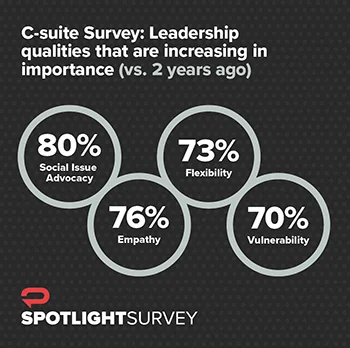A series of near-historic disruptions that have taken place in the last two years—among them: the COVID-19 pandemic, an increasingly polarized political environment, and ongoing geopolitical and economic uncertainty—has kicked off a dramatic change in corporate culture, affecting employee engagement, leaders’ managerial approaches and whether companies take public positions on social issues.
 |
The result? According to a three-part research study conducted by public relations agency Padilla, today’s business leaders find themselves conflicted, presenting broad implications regarding the need for strategic communications counsel.
The study, which explored how leadership approaches have changed in recent years and what those changes mean for companies’ communications functions, discovered that the challenges facing business leaders today are manifold. Nearly half (42 percent) of respondents said that coping with economic uncertainty accounts for the top challenge facing business leaders today. A third (33 percent) cited rising inflation, followed by public health incidents such as COVID-19 (32 percent), supporting employee well-being (29 percent) and attracting and retaining employees (27 percent).
When asked what single component in their role as leaders has increased most in importance during the last two years, a whopping 80 percent of business leaders cited social-issue advocacy, followed by empathy (76 percent), flexibility (73 percent), vulnerability (70 percent) and possessing a growth mindset (68 percent).
When it comes to what factors leaders consider when determining if and when it’s appropriate for their company to take a stand on a high-profile social issue, nearly half (47 percent) said it depends on whether the issue in question will remain important for years to come, followed by whether the company is a credible authority on the topic at hand (42 percent) and whether the issue is timely and relevant (42 percent). More than a third (34 percent) said a determining factor is whether declining to respond will negatively affect the company’s business and culture, and 30 percent said it depends on whether the issue ties in with the company’s strategic objectives.
Business leaders believe that credibility remains the single most important communications quality (74 percent), followed by authenticity (73 percent), confidence (66 percent), ethics (65 percent) and transparency (63 percent).
Padilla’s study, “The Changing Face of Leadership Communications,” surveyed 100 C-suite executives, business owners, and more than 1,000 employees online in June. The study additionally conducted one-on-one interviews with 25 CEOs.


 Consumers continue to place a premium on corporate responsibility, but they increasingly want to see that responsibility directed toward issues that affect the bottom line, according to a new study from Mission North
Consumers continue to place a premium on corporate responsibility, but they increasingly want to see that responsibility directed toward issues that affect the bottom line, according to a new study from Mission North Not all pressing issues require corporate voice! Brand stewards must must ask why and when their brands should engage, or if they need to engage on a particular issue at all.
Not all pressing issues require corporate voice! Brand stewards must must ask why and when their brands should engage, or if they need to engage on a particular issue at all. Dollar General investors voted in support of a shareholder resolution at its May 31 annual meeting for an independent third party audit of “worker safety and well-being.”
Dollar General investors voted in support of a shareholder resolution at its May 31 annual meeting for an independent third party audit of “worker safety and well-being.” Nonprofits and philanthropists have a unique opportunity to take ownership of conversations surrounding pressing social issues.
Nonprofits and philanthropists have a unique opportunity to take ownership of conversations surrounding pressing social issues.


 Have a comment? Send it to
Have a comment? Send it to 
No comments have been submitted for this story yet.